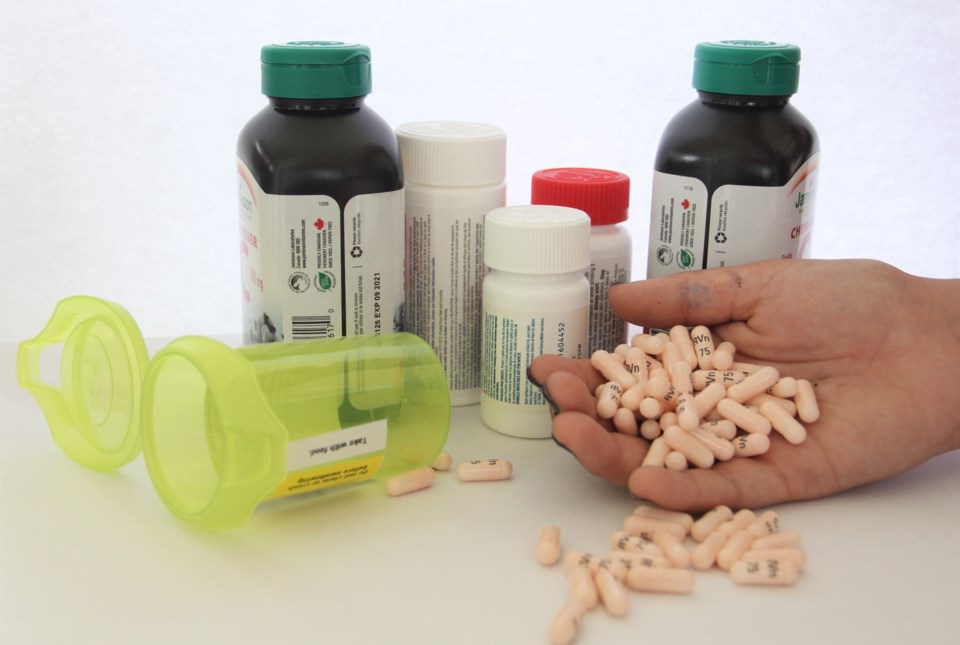People with unused or expires medications are being reminded to dispose of their prescriptions safely.
August is national Drug Drop-Off Month, an initiative spearheaded by Drug Free Kids Canada, a non-profit organization aimed at raising awareness of the dangers of teens and children using prescription medications recreationally.
Chantal Vallerand, executive director of Drug Free Kids, said the annual campaign has run the past nine years and is more important now than ever during the COVID-19 pandemic.
“In the context of pandemic, kids may want to turn to substances out of boredom or isolation, or they’re feeling stressed or anxious so they may be more tempted to experiment, so it’s important as a preventive measure to make sure they’re not accessible,” said Vallerand.
She said the opioid crisis continues to grow in Canada and young Canadians aged 15 to 18 are the fastest-growing population that requires hospital care from overdoses.
The August campaign aims to educate the public and ensure parents know the dangers lurking in their medicine cabinet, and how to address them.
“It’s really important for parents to use some preventive steps that are as easy as going through the medicine cabinet and making sure they’re safely storing whatever they’re using and return to the pharmacy what has expires or what is not being used,” said Vallerand.
Some parents would be shocked by study results that indicate about one in 10 high school students report using prescription painkillers without a prescription, meaning they are being used recreationally, she said.
“When we ask kids, kids that have used prescriptive medicine for recreational purposes, where they actually got the medicine, 55 per cent of them say they got it from home,” said Vallerand.
Most households keep their medications in places that are easily accessible to children, which poses a significant risk, she said. It’s an easy preventive measure to sort through the medicine cabinet regularly and ensure medications are stored safely or disposed of properly, she said.
It is possible to change out a cabinet to one with a locking door, or store narcotics or opiates in locking desk drawers, filing cabinets or safes, she said.
Most importantly, people need to talk to their children, she said. Even if a household has taken safety measures, other homes may not.
“Some kids are given the impression it could be safer than buying off the street or using other substances because it actually comes from the pharmacy and it’s a legitimate medicine,” said Vallerand. “It is a legitimate medication, but it’s meant to address a specific symptom within a specific individual through a health professional.”
She said parents need to educate their children as to the risks associated with taking non-prescribed medications, so they can make informed decisions when tempted.
It’s important to dispose of medications properly as well, so they are not found by somebody else or washed into the environment, she said.
That’s where local pharmacies come in. Rober Rofail, pharmacy manager at Okotoks HC Pharmacy, said most offer a drug drop-off program to help dispose of unused or expired prescriptions.
At HC Pharmacy, they ask people empty all their medications into a sealable plastic bag prior to bringing them in.
“We have special containers we put it in and then there’s a company that takes care of these medications,” said Rofail.
They are safely incinerated, rather than being dispersed in the water system or sent to the landfill, he said.
To further help mitigate addictions to narcotics or opiates, he said HC Pharmacy only dispenses two weeks or one month’s supply at a time for certain drugs.
“This way patients can keep track of it and they don’t have much quantity at home at all,” said Rofail.
For more information on Drug Free Kids and the national campaign visit www.drugfreekidscanada.org.
Krista Conrad, OkotoksToday.ca
COVID-19 UPDATE: Follow our COVID-19 special section for the latest local and national news on the coronavirus pandemic, as well as resources, FAQs and more.




